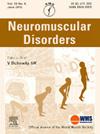在charco - marie - tooth 1X疾病小鼠模型中,通过重新利用fingolimod (FTY720)进行治疗性鞘氨醇-1-磷酸受体调节可减轻神经病变并改善临床结果
IF 2.7
4区 医学
Q2 CLINICAL NEUROLOGY
引用次数: 0
摘要
先前的研究表明,先天免疫系统和适应性免疫系统都促进了沙科-玛丽-图斯1X病小鼠模型的神经病变和临床症状的进展。在这里,我们展示了使用临床批准的鞘氨醇-1-磷酸受体调节剂fingolimod (FTY720)在模拟charco - mari- tooth 1X疾病的connexin32缺陷小鼠中可能的治疗翻译。用FTY720治疗可阻止股四头肌神经和脊髓前侧根中CD8+和CD4+ t淋巴细胞数量的增加。脊髓前侧根的巨噬细胞表现出类似的趋势,尽管不明显,但股四头肌神经的巨噬细胞在治疗后并未减少。在组织病理学水平上,治疗后腹侧脊髓根的轴突病变减少,但股四头肌神经没有。电生理记录显示,FTY720治疗后神经传导参数有所改善,而临床上,FTY720治疗改善了运动表现和握力的不同参数。我们建议靶向适应性免疫系统可能是减轻疾病负担的一种药物治疗选择,特别是在严重的Charcot-Marie-Tooth 1X病例中。本文章由计算机程序翻译,如有差异,请以英文原文为准。
Therapeutic sphingosine-1-phosphate receptor modulation by repurposing fingolimod (FTY720) leads to mitigated neuropathy and improved clinical outcome in a mouse model for Charcot-Marie-Tooth 1X disease
Previous studies have shown that both the innate and adaptive immune systems foster progression of neuropathy and clinical symptoms in a mouse model for Charcot-Marie-Tooth 1X disease. Here we demonstrate a possible therapeutic translation of these findings using the clinically approved sphingosine-1-phosphate receptor modulator fingolimod (FTY720) in connexin32-deficient mice mimicking Charcot-Marie-Tooth 1X disease.
Treatment with FTY720 prevented an increase of CD8+ and CD4+ T-lymphocyte numbers in both femoral quadriceps nerve as well as in ventral spinal roots. While macrophages of ventral spinal roots show a similar, albeit non-significant trend, macrophages from quadriceps nerve are not reduced upon treatment. On the histopathological level, axonopathic changes were reduced in ventral spinal roots, but not in quadriceps nerves upon treatment. Electrophysiological recordings displayed improved nerve conduction parameters upon FTY720 treatment, while clinically, FTY720 treatment ameliorated distinct parameters of motor performance and grip strength. We suggest that targeting the adaptive immune system might be a pharmacological treatment option for mitigating disease burden particularly in severe cases of Charcot-Marie-Tooth 1X.
求助全文
通过发布文献求助,成功后即可免费获取论文全文。
去求助
来源期刊

Neuromuscular Disorders
医学-临床神经学
CiteScore
4.60
自引率
3.60%
发文量
543
审稿时长
53 days
期刊介绍:
This international, multidisciplinary journal covers all aspects of neuromuscular disorders in childhood and adult life (including the muscular dystrophies, spinal muscular atrophies, hereditary neuropathies, congenital myopathies, myasthenias, myotonic syndromes, metabolic myopathies and inflammatory myopathies).
The Editors welcome original articles from all areas of the field:
• Clinical aspects, such as new clinical entities, case studies of interest, treatment, management and rehabilitation (including biomechanics, orthotic design and surgery).
• Basic scientific studies of relevance to the clinical syndromes, including advances in the fields of molecular biology and genetics.
• Studies of animal models relevant to the human diseases.
The journal is aimed at a wide range of clinicians, pathologists, associated paramedical professionals and clinical and basic scientists with an interest in the study of neuromuscular disorders.
 求助内容:
求助内容: 应助结果提醒方式:
应助结果提醒方式:


